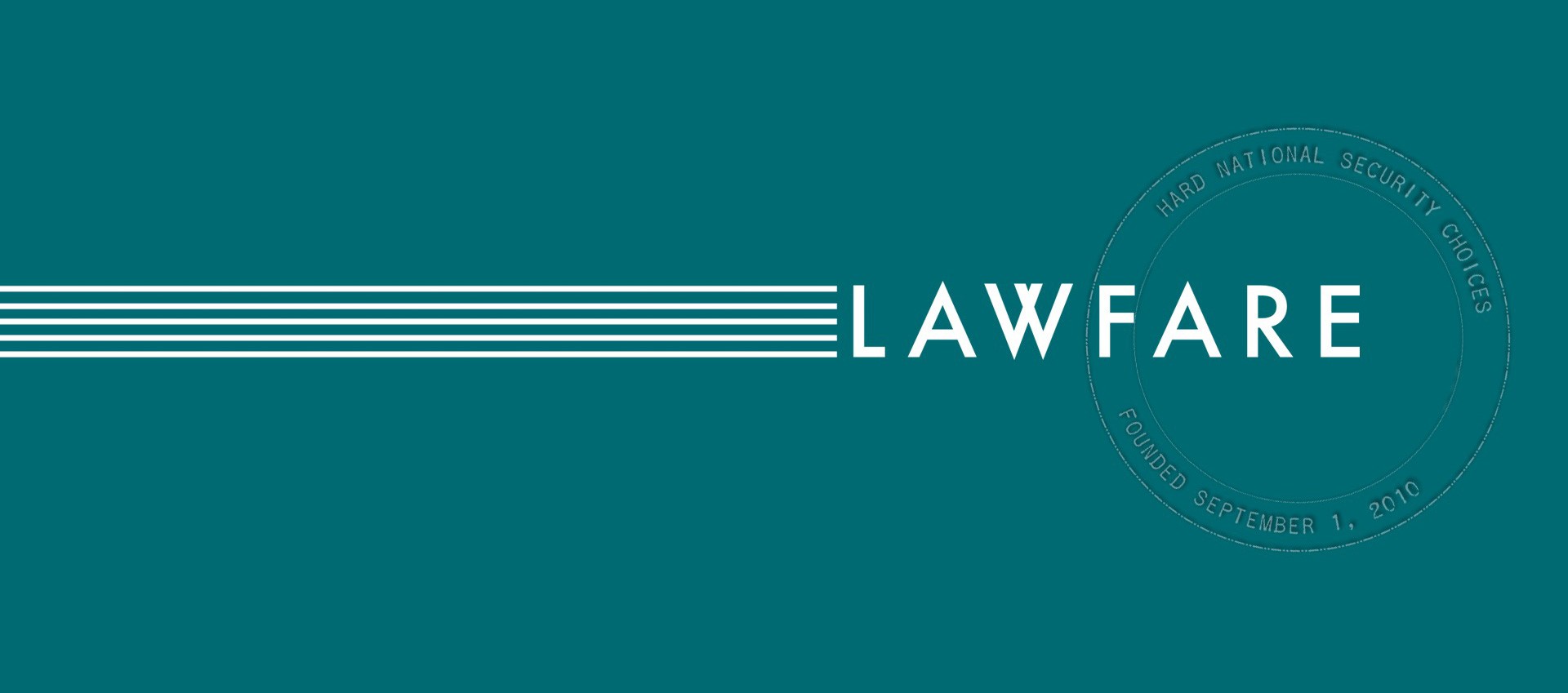The Week That Was: All of Lawfare in One Post
Your weekly summary of everything on the site.

Published by The Lawfare Institute
in Cooperation With

Anna Bower and Benjamin Wittes reported on the second week of former President Donald Trump’s hush money criminal trial, from Justice Juan Merchan’s courtroom. Wittes and Bower discussed Trump’s $9,000 fine for violating the gag order, testimonies from the witnesses, and more.
Bower and Wittes reported on the first week of Trump’s New York hush money trial, where David Pecker finished his testimony and two others, Rhona Graff and Gary Farro, took the stand.
On May 3, Tyler McBrien talked to Bower and Wittes for Lawfare's post-court dispatch, “Trump Trials & Tribulations: N.Y. Trial Dispatch, May 3.” If you couldn’t attend, the episode will be available immediately afterward on Lawfare’s YouTube channel or later as a podcast on the Lawfare Podcast feed. You can also watch all previous dispatches here:
On May 1, Wittes joined Roger Parloff, Quinta Jurecic, and Bower for this week’s episode of “Lawfare Live: Trump’s Trials and Tribulations.” If you couldn’t attend the live event, the recording is available on Lawfare’s YouTube channel or over the weekend on the Lawfare Podcast feed:
Jack Goldsmith argued that criticism of the oral argument in Trump v. United States, heard last week by the Supreme Court, is unfounded. He argued that critics’ exaggerated claims about the justices’ reactions and questions lack basis given the novelty of the question at hand.
Natalie Orpett and Katherine Pompilio announced the fifth and final episode of The Aftermath Season 2, entitled “With Liberty and Justice for Some,” which examines the criminal prosecutions of those responsible for the Jan. 6 attack on the U.S. Capitol. Orpett and Pompilio explained the major themes of each episode this season, discussed the ways those responsible for the insurrection have and have not been held to account, and pondered whether enough has been done to prevent a future attack, and ensure the stability and security of American democracy.
On Rational Security, Alan Z. Rozenshtein, Jurecic, and Scott R. Anderson were joined by Eric Ciaramella to talk through the week’s big national security news stories. They discussed the future of the conflict in Ukraine amid Congress’s approval of a foreign aid package, the wide-ranging arguments heard by the Supreme Court in Trump v. United States, a recent Washington Post story that suggested the United States disrupted the potential assisination of a Sikh dissident and U.S. national on its territory, and more:
On Lawfare Daily, Pompilio sat down with Molly Reynolds to unpack the National Security Package—a bundle of legislation that provides aid to Ukraine, Israel, and Taiwan and requires TikTok's ByteDance to divest from the app—and its journey through Congress. They talked about the group of hardline Republicans that blocked the legislation in the House, how House Speaker Mike Johnson had to rely on the help of Democrats to get the aid package for a vote on the House floor, and more:
Also on Lawfare Daily, Stephanie Pell sat down with Justin Sherman to talk about the benefits and limitations of the Protecting Americans’ Data From Foreign Adversaries Act, which was signed into law by President Joe Biden on April 24. They talked about the path that led to the bill’s passage in both the House and Senate, similarities and differences between this new legislation and a recent Executive Order focusing on preventing the sale of American’s bulk sensitive personal data, and more:
Kevin Allison and Paul Triolo discussed the new know-your-customer rules proposed by the Commerce Department, which would require cloud-service-providers to collect data on their customers, their direct account holders, and beneficial owners. Allison and Triolo examined the trends surrounding this policy change, the potential issues of implementation, and the rules’ impact on a potential multilateral cyber safety regime.
In the latest installment of the Seriously Risky Business cybersecurity newsletter, Tom Uren discussed how the Federal Trade Commission aims to publish rules regarding “commercial surveillance,” Microsoft’s alleged prioritization of security, the Commerce Department's push for know-your-customer programs, and more.
Matt Gluck shared the Biden administration’s “National Security Memorandum on Critical Infrastructure Security and Resilience,” which aims to promote the safety and security of U.S. critical infrastructure.
On Lawfare Daily, Orpett and Brandon Van Grack spoke with Elizabeth Cannon about a new office within the Department of Commerce: the Office of Information and Communications Technology and Services. They talked about the office's recent activities, who it regulates, how it sets priorities, and more:
Preston Marquis explained the rigorous and controversial process of reauthorizing Section 702 of the Foreign Intelligence Surveillance Act in Congress. Marquis detailed the monthslong negotiation process between Republicans and Democrats, as well as the various concessions made on the legislation to get it through the House and Senate.
Ben Scott argued that establishing an open source intelligence agency is necessary to bring the intelligence community into the digital information age and to disrupt its long-standing culture of secrecy and overclassification.
On Chatter, Shane Harris sat down with Vince Houghton to discuss his new book, “Covert City: The Cold War and the Making of Miami,” which details how the Central Intelligence Agency operated in Miami during the 60s to undermine the regime of Cuban leader Fidel Castro. They spoke about some of the colorful characters that span this decades-long story, why Miami has played such a pivotal role in the history of U.S. spying, and more:
Shelby Grossman, Riana Pfefferkorn, and Sara Shah argued that the current system of reporting child sexual abuse material online to law enforcement is insufficient, and explained how to improve it.
Alex O’Neill explained how U.S. authorities have had limited success in targeting North Korean cyber criminals in their digital illicit finance activities. O’Neill argued for a new approach to address the issue, including nurturing compliant virtual asset platforms as well as a push to raise global anti-money laundering and cybersecurity standards.
Brandon Kirk Williams argued that the United States needs to establish a new unclassified strategy to maintain its leadership in quantum research and development globally. He recommended that policymakers adopt a proactive approach and renew the National Quantum Initiative Act to demonstrate federal commitment to the field.
On Lawfare Daily, Wittes sat down with Dmitri Alperovitch to talk about his new book, “World on the Brink: How America Can Beat China in the Race for the Twenty-First Century.” In addition to his book, they discussed the tensions in the Taiwan Strait, deterring China from invading Taiwan, the history of what Dmitri calls “Cold War II,” and more:
Maya Nicholson shared a preliminary ruling by the International Court of Justice in Nicaragua v. Germany, rejecting Nicaragua’s request to order Germany to stop selling arms to Israel.
In the latest installment of Lawfare’s Foreign Policy Essay series, Luis Schenoni and Raul Madrid found from their research that while militarization as a means of addressing domestic political violence in Latin America was an effective solution in the 19th century, the lack of investment in military and security forces makes it no longer a sustainable option.
On Lawfare Daily, Anderson sat down on a panel with General Craig McKinley, General Joseph Lengyel, Brigadier General Allyson Solomon, Major General Daryl Bohac, and Paul Stockton to talk about the recent trend of governors using their respective National Guards for domestic missions. They discussed how this may impact the National Guard, broader democracy particularly in this pivotal election year, and more:
And on April 3, Lawfare announced another auction item on the Givebutter campaign—the “Black Hole of Awful” Post-It by Jurecic, one-of-a-kind Lawfare sketch born from a conversation with Wittes that illustrates the extent to which trial delay is advantageous to Trump. Other items of exclusive Lawfare merchandise up for auction include an autographed Lawfare jigsaw puzzle and Wittes’s Twitter sensation and protector of democracy #BabyCannon. Place your bids to support Lawfare’s Trump Trials coverage. You can also support Lawfare’s Trump Trials coverage by making a contribution here.
And that was the week that was.




